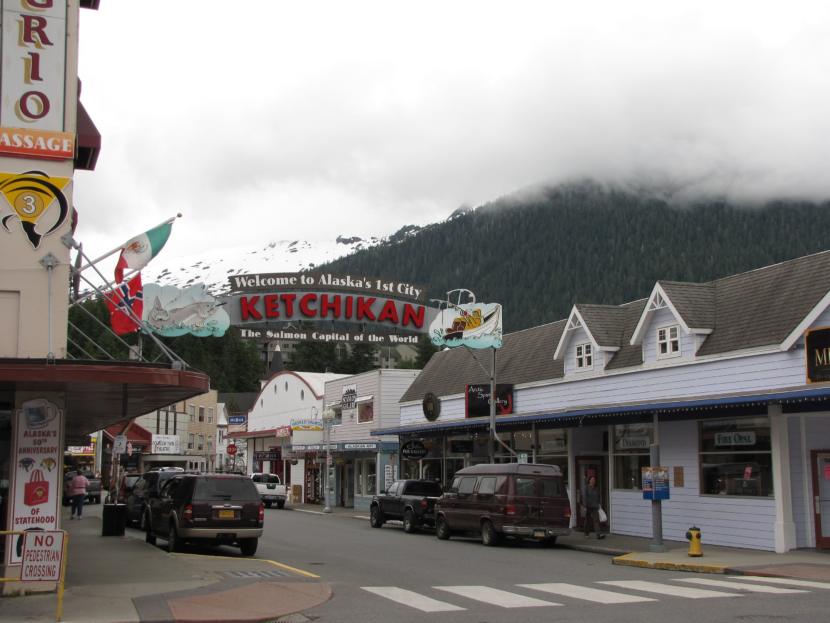
So far, at least 100 people in Ketchikan have been tested for coronavirus. Of those, 13 have tested positive as of Tuesday evening.
Most of the cases are thought to stem from one or two people who brought the virus back from a trip. But has anyone tested positive without a clear sense of where they caught it?
After someone tests positive for coronavirus, state health officials classify them in one of three ways.
First, there’s “travel-related.” That’s when they believe they caught it while out of town — that’s pretty self-explanatory.
If someone catches it from someone else who’s tested positive — like a coworker, friend or family member — that’s called “close contact.”
But if someone hasn’t recently traveled out of state or been in close contact with someone known to have the virus — and thus, officials can’t pinpoint the source of the infection — the state calls it a “non-travel” case. The Centers for Disease Control and Prevention call it “community transmission,” or “community spread.”
Why is that important? Because it means there are unknown contagious people infecting others within the town. And that makes it a lot harder to curb the virus’s spread.
Last Thursday, Alaska’s state epidemiologist said in a release that state health officials had “convincing evidence of community transmission” in Ketchikan, Anchorage and Fairbanks.
But officials in Ketchikan disagreed. According to their tracking, everyone who had been diagnosed with COVID-19 in Ketchikan had either recently traveled out of state or been in contact with someone who had.
So who’s right? It comes down to a single case.
“We did some background checking on that, talked to (the state section of) epidemiology today, and the difference in the reporting has to do with the way that their contact investigation and follow-up goes,” said Abner Hoage in a Tuesday news conference call. He’s in charge of Ketchikan’s response to the COVID-19 pandemic.
Here’s what happened: One person who tested positive — let’s call them Alex — was in direct contact with another confirmed case — let’s call that person Barbara. Alex and Barbara worked together in the same building and frequently saw each other.
“Initially, they attributed this case to a close contact,” he said.
But during state public health officials’ follow-up investigation, they discovered that Alex couldn’t have caught it from coworker Barbara — the dates didn’t match up.
“So it may appear that he is part of the cluster. But the timing of onset means that he isn’t,” Hoage said.
So where did Alex catch the coronavirus?
“His most likely source appears to be another coworker who was symptomatic early, and that person was a roommate or close friend and had been traveling internationally,” Hoage said.
Let’s call Alex’s roommate (or close friend) Charlie. Hoage said Charlie had the symptoms of COVID-19, but he couldn’t get tested. A shortage of test kits meant only people who fell under narrow criteria were tested. And Charlie didn’t qualify.
So while health officials think Alex probably caught the virus from Charlie, they don’t know for sure. Because Charlie was never tested.
“Because you don’t have the hundred-percent confirmation that where we think it came from actually is where it came from,” Hoage said.
And that means that Ketchikan has seen its first case of community spread.
But here’s the good news: Drastic measures aimed at curbing the spread of COVID-19 in Ketchikan appear to be showing some early success.
As of Tuesday evening, Ketchikan has seen 13 people test positive for the coronavirus — with no cases added to the tally since Saturday.
Nine of those 13 have recovered, leaving only four active cases, Hoage said.
So does that mean all this “hunker down” stuff is working? Hoage thinks so.
“And we thank everyone for the work that they’re doing and the sacrifices they’re making. But now’s not the time to let up on that,” Hoage said. “Now’s the time to double down on that.”
Hoage cautions that Ketchikan’s testing capacity is still limited, and that makes it difficult to track the virus.
But there’s good news on that front, too: More test kits are coming to Ketchikan.
Hoage said that local authorities have 160 test kits, with 100 more expected in the coming days. Another 600 are scheduled to be delivered within the next couple of weeks. With the stock of testing supplies expanded, Hoage said more people should qualify for tests in the near future.
And beyond that, Dr. Peter Rice with the PeaceHealth Ketchikan Medical Center said the hospital recently received a newly-developed rapid testing platform from diagnostic manufacturer Qiagen.
“That will allow us here to run the COVID test ourselves, and that will have a turnaround time of about two hours,” Rice said Tuesday.
That’ll allow doctors to make informed decisions about how to treat and isolate each patient before they get a chance to infect others in the community.
At this point, PeaceHealth said they’re just waiting for the reagents to get started.
